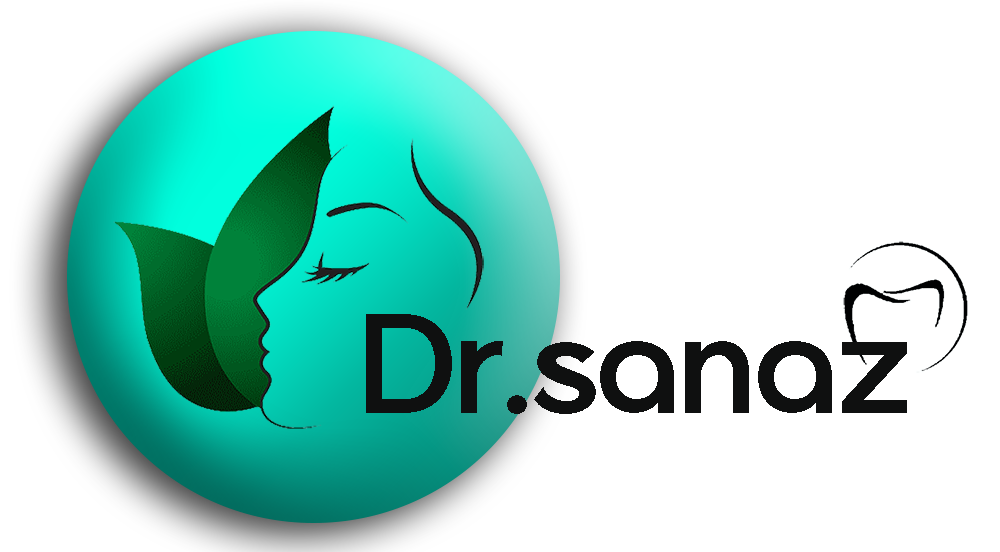

How To Get Rid Of Acid Reflux?
Table of Contents
Gastric reflux occurs when the contents of the stomach move into the esophagus. This complication is also called acid reflux. If you experience its symptoms more than twice a week, you may have gastroesophageal reflux disease or GERD. Therefore, it is better to see a gastroenterologist.
Gastric reflux disease affects about 20% of people. If left untreated, the persistence of gastric reflux can lead to severe problems, including cancer or other gastrointestinal diseases.
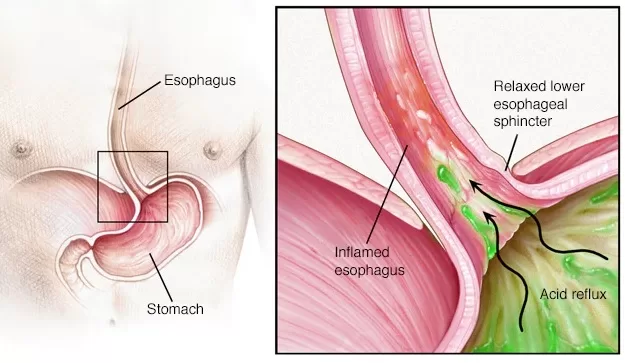
What is gastric reflux?
Gastric reflux occurs when acid and other stomach contents return to the esophagus through the lower esophageal sphincter. The lower esophageal valve is a ring-shaped muscular valve at the esophagus’s end and the stomach’s beginning.
By opening this valve, the swallowed food enters the stomach from the end of the esophagus. After food enters the stomach, this valve closes to prevent food from returning to the esophagus. When this valve is weakened or damaged, it may not function properly. This is what causes gastric reflux.
Doctors believe that if the symptoms of gastric reflux occur more than twice a week, it is likely that the person has this disease.

Reflux disease can be divided into different types.
- Recurrent but nonprogressive Reflux ( classic reflux )
- Progressive Reflux
In classic reflux, stomach contents usually rise only in the esophagus and do not reach the pharynx. classic reflux symptoms appear mainly in the form of heartburn (heartburn).
Symptoms of gastric reflux
The symptoms of gastric reflux vary according to the organ affected by stomach acid. Not all people experience the same symptoms. Reflux symptoms range from mild to severe and usually occur after eating (especially spicy or fatty food) and when lying down or bending over.
Symptoms of gastric reflux include the following:
Pain or heartburn accompanied by a burning sensation in the chest; This burning may also reach the throat.
Bitter or sour taste in the throat. In some cases, some of the food or liquid in the stomach may return to the mouth.
Indigestion is accompanied by pain and discomfort in the upper abdomen. Symptoms of indigestion include stomach upset, nausea and vomiting, and an annoying feeling of fullness.
Sometimes, problems with swallowing sometimes disturb the person’s breathing.
Sore throat, severe hiccups, or vomiting.
If you are familiar with the above signs and symptoms or experience them occasionally, seeing your doctor as soon as possible is better.

Voice change due to reflux
Many people suffer from reflux. In these people, the stomach contents move backward and against the natural direction, even up to the throat. When the stomach contents reach the throat with this reverse movement, it is called laryngopharyngeal reflux.
Gastric secretions are rich in acid and enzymes that we need to digest food in the stomach. Naturally, these substances cause damage to the tissues of that part (throat and larynx) in any place other than the stomach and intestines.

Cause of voice change in reflux
As we said in laryngeal-laryngeal reflux, stomach secretions damage the vocal cords and larynx and inflame the larynx. Inflammation of the larynx is called laryngitis; in this case, the name reflux laryngitis is applied to it.
Symptoms of laryngopharyngeal reflux
The symptoms of laryngopharyngeal reflux are primarily as follows:
- Clearing of the chest (similar to short coughs) frequently
- The feeling of a lump in the throat
- voice hoarseness (voice change)
- Cough
- Sore throat
- More respiratory secretions
- Bitter or sour taste in the mouth
- Aggravation of voice symptoms by eating spicy foods
Note that the symptoms caused by laryngeal-laryngeal reflux are very similar to other diseases of the throat and larynx. It is suggested to consult an otolaryngologist at the same time as an internist or general practitioner to ascertain the cause of this problem.
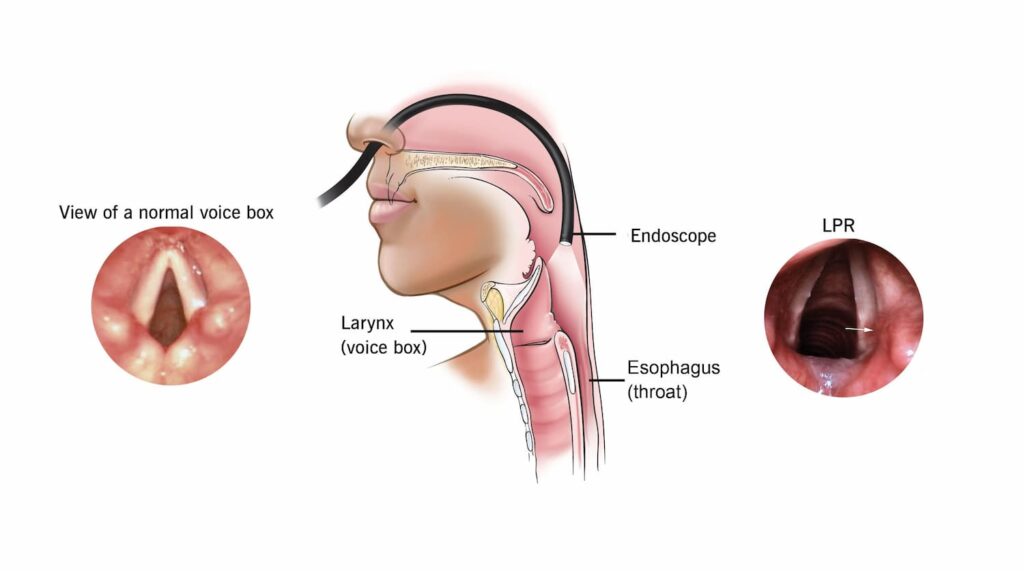
Why is heartburn less common in laryngeal-pharyngeal reflux?
People with laryngopharyngeal reflux are less likely to complain of heartburn. Heartburn occurs due to the return of stomach contents to the esophagus and inflammation in the esophagus wall. This disease is called classic reflux or gastroesophageal reflux.
Although we know that stomach contents pass through the esophagus to reach the pharynx, it is not well understood why people with laryngopharyngeal reflux experience less heartburn.
Diagnosis of gastroesophageal reflux disease
The above symptoms, especially heartburn, are good signs for diagnosing gastric reflux. If the treating doctor suspects gastric reflux, he asks the patient to perform some related examinations and tests before diagnosis and confirmation.

The attending physician may use one or more of the following tests to diagnose gastric reflux:
Swallowing a solution containing barium substance: imaging the digestive system is impossible under normal conditions. Drinking a solution containing barium makes it possible to take pictures of the digestive system. This method is used to diagnose gastric reflux.
Endoscopy: A flexible tube with a tiny camera is sent into the esophagus for examination and sampling (if needed).
Esophageal pH monitoring: A pH meter is inserted into the esophagus to monitor the entry of stomach acid into the esophagus.
Esophageal tonometry: A flexible tube is passed into the esophagus to measure the strength of the muscles in the esophagus.
Possible side effects of acid reflux
In most people, gastric reflux does not cause serious complications. However, in rare cases, it can lead to severe or even life-threatening problems.
Possible complications of reflux include the following:
- Esophagitis or inflammation of the esophagus
- Esophageal stricture, which occurs when the esophagus narrows or hardens.
- Barrett’s esophagus involves permanent changes in the lining of the esophagus.
- Esophageal cancer affects a small proportion of people with Barrett’s esophagus.
- Asthma, chronic cough, or other breathing problems may occur if stomach acid enters the lungs.
- Enamel erosion, gum disease, or other dental problems
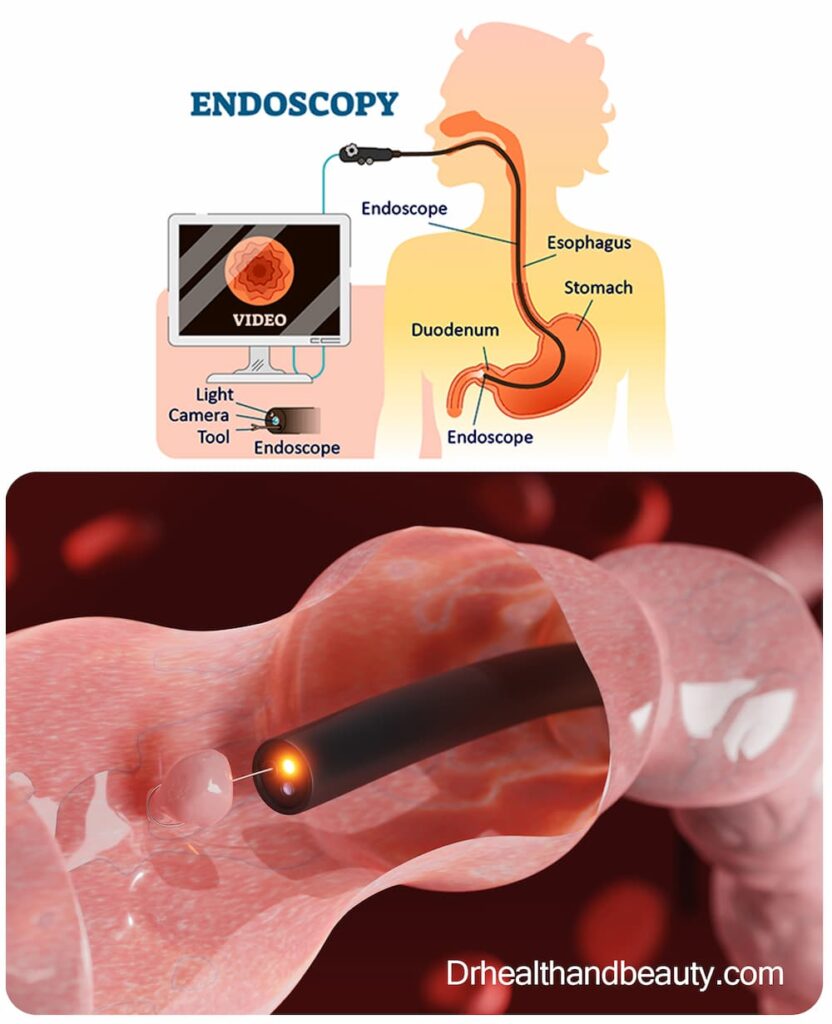
Some factors can increase the likelihood of developing gastric reflux, including the following:
- obesity
- pregnancy
- Hiatal hernia
- Connective tissue disorders
Having some lifestyle behaviors can also increase this risk, for example:
- smoking
- Eating heavy meals
- Lying down or sleeping immediately after eating
- Eating certain types of foods, such as fried or spicy foods
- Drinking large amounts of certain types of beverages, such as soda, coffee, or alcohol
- Use of non-steroidal anti-inflammatory drugs (NSAIDs) such as aspirin or ibuprofen
The Role of Anxiety in acid reflux
Anxiety may worsen some symptoms of reflux. If you suspect that anxiety is worsening your symptoms, talk to your gastroenterologist about ways to relieve it.

Some things you can do to reduce anxiety include:
Limit your interactions with experiences, people, and places that cause anxiety.
Learn relaxation techniques such as meditation or deep breathing exercises.
Modify your sleeping habits, daily exercise, or other lifestyle behaviors.
Prevention and treatment of gastric reflux
Changing your lifestyle and diet is one of the most effective ways to prevent and treat gastric reflux. Some points to keep in mind in the treatment of gastric reflux are:
- Quit smoking.
- Make your meals smaller.
- Do not lie down immediately after eating.
- Chew gum after eating.
- Avoid eating and drinking foods that aggravate the symptoms of gastric reflux.
- Do not wear tight clothes and belts.
- If you are overweight, it is better to think about losing it.
- If the above measures do not work, the doctor may prescribe medicine to treat gastric reflux.
Depending on the progress and seriousness of the disease, the ways to treat reflux can be different. Sometimes the patient can control his disease without needing chemical drugs, using acupuncture or other herbal and home remedies, and gradually learn how to tolerate it.
Sometimes, the course of the disease is so fast and robust that visiting a doctor, receiving a controlled treatment guide and using stomach and digestive drugs such as ranitidine, pantoprazole, lansoprazole and omeprazole should be done as soon as possible.
Gastric reflux surgery
In most cases, lifestyle modification and drug therapy are sufficient to relieve symptoms of gastroesophageal reflux. However, sometimes, surgery is also necessary. Surgery may be recommended if other solutions are ineffective or side effects occur. There are many different types of surgery to treat acid reflux.
Conclusion
Gastroesophageal reflux disease (GERD) is a digestive disorder affecting the ring of muscle between the esophagus and the stomach. This loop is called the lower esophageal sphincter (LES). Patients with gastric reflux suffer from heartburn or indigestion. Some doctors say a hiatal hernia can cause gastric reflux. Fortunately, in most cases, gastric reflux can be treated with lifestyle changes and a suitable diet, but some sufferers must go for drug treatment or even surgery.
See a gastroenterologist if you experience severe or frequent reflux symptoms or have used over-the-counter heartburn medications more than twice a week and still have not improved.
Reference:
Share in :
Explore more

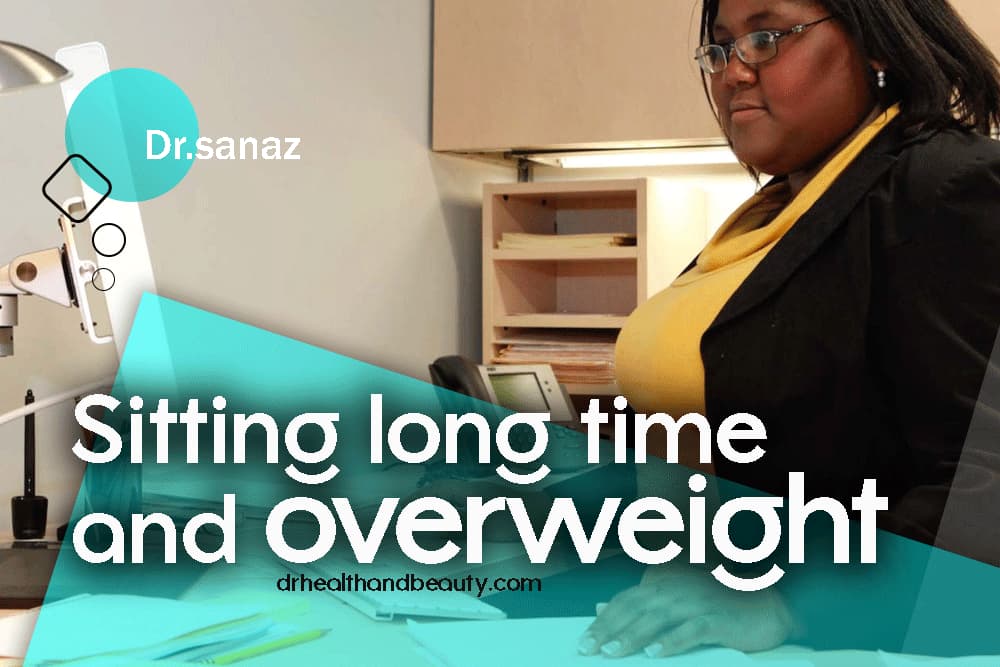
Sitting A Long Time And Being Overweight- Drhealthandbeauty

